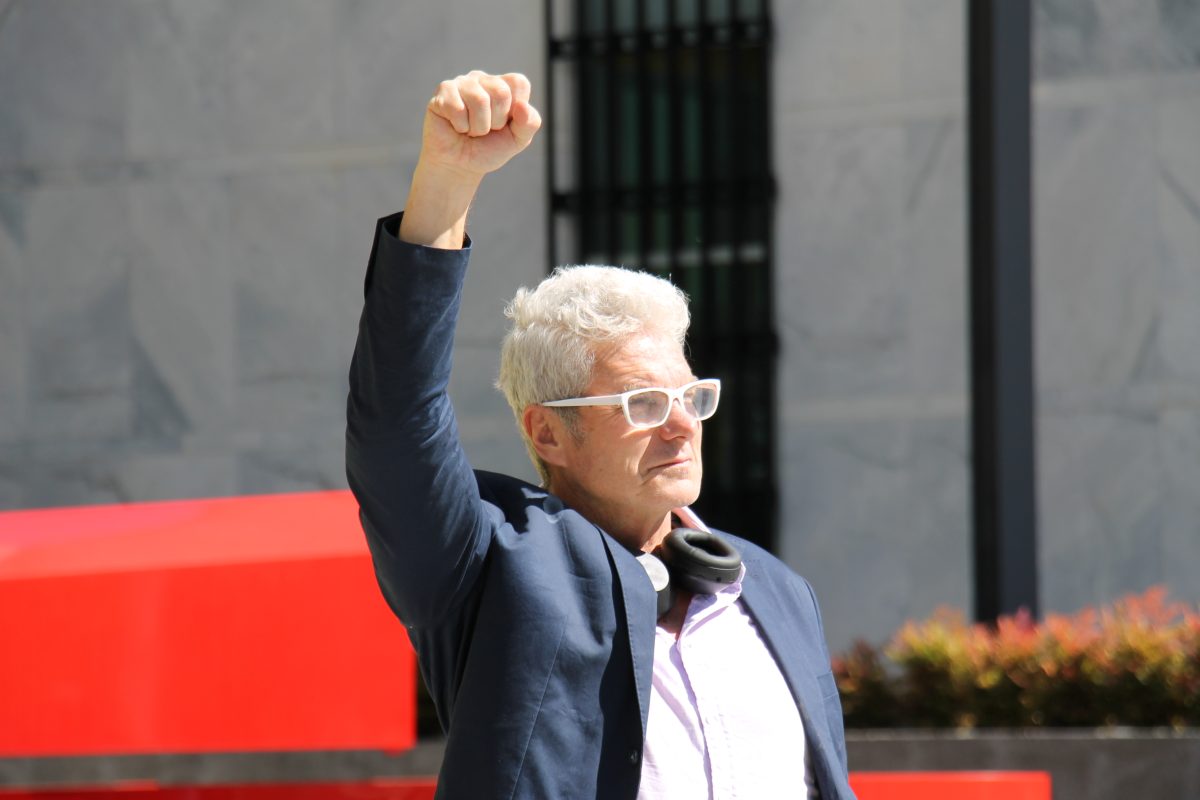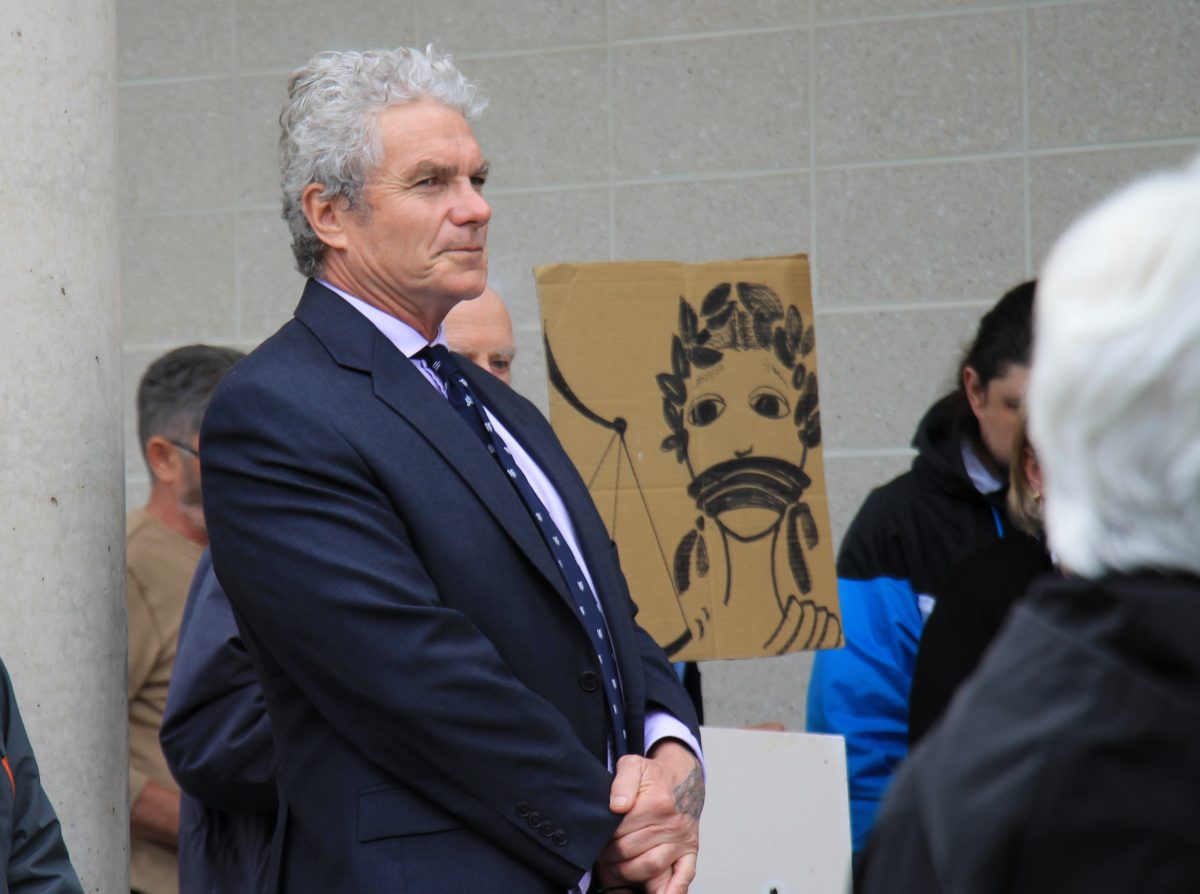
David McBride’s court hearings were often attended by a large number of supporters. Photo: Albert McKnight.
Unbeknownst to potential homebuyers inspecting David McBride’s house, they had been walking past 207 documents containing secret military information sitting in plastic tubs in his loungeroom cupboard.
The whistleblower, who went on to leak many of these documents to three journalists, one of whom used them to report on allegations of soldiers killing civilians in Afghanistan, was sentenced to five years and eight months’ jail by the ACT Supreme Court on Tuesday (14 May).
“Shame on the court. Shame on Attorney-General [Mark] Dreyfus. This should not be happening,” one of McBride’s supporters loudly announced before the sentencing began.
The courtroom’s gallery was packed and supporters erupted in protest once the jail sentence was delivered, with cries of, “Shame on you”, “You know what you’re doing is wrong”, “This is not justice” and “Evil”.
McBride gave some of the documents to journalist Dan Oakes, which were used to form part of the ABC’s The Afghan Files report in 2017. The articles detailed alleged incidents of soldiers killing unarmed men and children.
However, Justice David Mossop said the focus of these articles was “the exact opposite” of what McBride had intended when he handed the documents over.
McBride joined the Australian Defence Force (ADF) as a reserve legal officer in 2005 and signed acknowledgements to keep information confidential.
He was promoted to the rank of major, was deployed to the Afghanistan base of Tarin Kot in 2011 and 2013 to work as a legal officer, was discharged from the ADF in 2017 for medical reasons and was then diagnosed with post-traumatic stress disorder.
Meanwhile, in 2014, he had become concerned that practices in the ADF were “corrupt” and he began stealing military documents by printing them off at Defence Force facilities, placing them in his backpack, and then taking them home to store them in plastic tubs in his loungeroom cupboard.
He took 235 documents, 207 of which were classified ‘secret’.

David McBride attends a rally outside the ACT courts in 2022. Photo: Albert McKnight.
At his sentencing hearing earlier this month, barrister Stephen Odgers SC said McBride thought the ADF had adopted a policy of “excessive investigation” of soldiers when there was no proper basis for such investigation and suspected the “highest levels of the ADF” were responsible for these “PR exercises”.
He also thought, as a result, “good soldiers were put through serious trauma”.
McBride reported his complaints to the Inspector-General of the Australian Defence Force and police, but these ultimately did not proceed.
He then shared some of the documents with journalists Chris Masters and Andrew Clark, which didn’t result in reporting, before the ABC’s Dan Oakes approached him in 2016.
The documents he gave to Mr Oakes resulted in The Afghan Files. He later told police, “He did do a story on it, but a totally different story to the one that I was pushing”.
Justice Mossop said McBride’s motivation was to remedy what he perceived to be an injustice in the ADF, and he thought there had been investigations into individuals due to political pressure on defence force management.
He had told the police he had always thought he would be “vindicated” at some point and that someone would tell him he had done well to expose “corruption”.
An author of a court report said he had minimised his offending, hadn’t expressed remorse and thought his conduct would be protected under a defence of acting in the public interest, which a judge had ruled was not available to him.
He also said his theft of the documents was justified to prove his claims, and he had to turn to the media when he became unsatisfied with the results of his internal complaints.
Justice Mossop accepted McBride had demonstrated a “strong devotion to his duty”, and his experience in Afghanistan caused him to “lose faith” in senior leadership, but also said it was his “misguided self-belief” that led to his offending.
The judge said he had become “so convinced” of the “correctness of his own opinions” that he had become unable to operate within the legal framework that his work required him to.
The judge said he would impose a full-time jail sentence as the harm done to the community was significant, his moral culpability was high and an intensive corrections order, which is a community-based sentence, was not appropriate.
After spending years fighting his charges, McBride ultimately pleaded guilty to three charges before his trial was scheduled to start.
These were one count of theft and two counts of the unauthorised communication of military information to other people while a member of the Defence Force.
He was handed a non-parole period of two years and three months in jail, which means he is eligible to be released in August 2026.
It is understood the 60-year-old will be launching an appeal.





















The whole education industry is facing terminal disruption through the universal availability of AI.… View